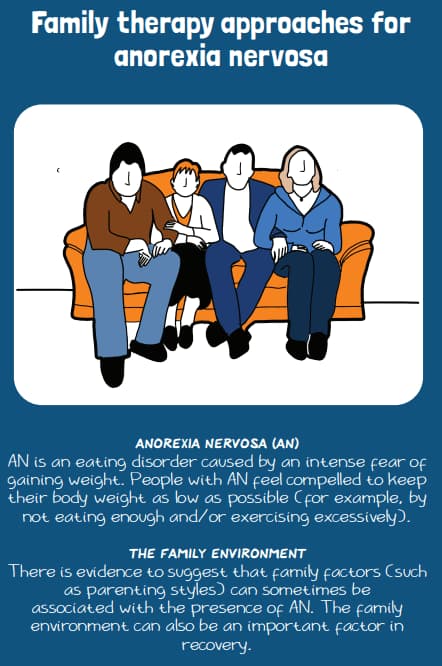
Treating an eating disorder holistically can help you address the symptoms, achieve a healthy weight and maintain your physical and emotional wellbeing. Your treatment plan is determined by your specific disorder and symptoms. Most eating disorder treatments are a mix of psychological therapies, nutritional counselling and exercise, which aim to improve mental, emotional and physical health.
Getting the right treatment for your eating disorder can help you not only recover but also transition from emotional eating to intuitive eating, which follows the concept of listening to your body and eating the right kind and amount of food that feels good to you.
Read on to explore evidence-based treatments for anorexia nervosa, bulimia nervosa, binge eating disorder and other similar conditions. The following therapies have also been shown to aid in the treatment of body image issues and laxative abuse.
Different Types of Eating Disorder Therapies
Each type of eating disorder therapy works in a different way to help you recover from an eating disorder and reach a normal weight. Some focus on getting your eating under control, some look at the underlying causes of your unhealthy relationship with food, while others help you to regain the skills that you've lost over time by not eating properly.
The most common eating disorder therapies include:
- Cognitive behaviour therapy (CBT)
- Family therapy
- Psychodynamic psychotherapy
- Interpersonal psychotherapy(IPT)
- Nutritional counselling
- Group therapies
- Anorexia nervosa-specific eating disorder therapies
Cognitive Behaviour Therapy (CBT)
CBT is a form of eating disorder therapy that has been most extensively researched and is therefore the most commonly used approach when treating eating disorders. CBT will usually consist of eight to 25 sessions with a mental health professional who specialises in said modality. It can be done one-on-one or in a group setting.
CBT also involves evidence-based outpatient treatments that you can do at home between sessions. These might involve keeping a food diary to track your eating habits and moods, learning how to recognise negative thoughts about yourself, which often result in negative body image, and changing your eating disorder behaviours in order to deal with them.
Family-based Treatment
If your eating disorder can't be treated by individual therapy alone, or you don't want to be treated that way, treatment approaches that involve the participation of your family members may help.
Your therapist may recommend counselling if you have an eating problem related to a mental health issue such as anxiety or depression. Family counselling for eating disorders works by building on existing relationships with parents, siblings or partners, and encouraging them to support you on your recovery journey. Family-based treatments have been shown to be beneficial for children and adolescents with anorexia nervosa, a condition characterised by an intense fear of gaining weight. According to treatment providers, a person's family environment is one of the contributing factors to their relationship with food.

Source: Information for Practice
Psychodynamic Therapies
Psychodynamic therapy may be prescribed alternatively for eating disorders caused by more complex psychological factors such as body dysmorphia or having a distorted body image, eating disorders caused by sexual abuse, or eating problems caused by cultural pressures on food and beauty.
Focal-dynamic psychotherapy is a time-limited psychological intervention that uses various techniques to help you identify unresolved issues from your past or difficulties in your current life that led to your eating problems. Once you have identified the root cause of your eating disorder, it will be easier to achieve profound therapeutic changes.
Interpersonal Psychotherapy (IPT)
A course of eating disorder counselling can involve IPT, which works by looking at interpersonal relationships and how they might be affecting your eating habits. It is a present-focused therapy that aims to help people build on their interpersonal resources to resolve eating disorder behaviours that stem from interpersonal problems such as difficulty maintaining relationships.
Nutritional Counselling
This form of therapy has been shown to be effective in the treatment of eating disorders in children and adults with anorexia nervosa. It involves correcting nutritional deficiencies or eating habits that might be causing or worsening a patient's eating disorder.
Regardless of your eating disorder, nutritional counselling can help you by teaching you how to increase the quality of your diet while still reducing caloric intake. This type of therapy guides you through different types of food you should eat to address your eating disorder behaviours.
Group Therapy
Group therapies for eating disorders are typically created around common eating disorder topics such as weight management or accepting eating patterns. There is usually a variety of tools shared among members of the group therapy sessions. Through this intervention, individuals can recover through encouragement, support, education and understanding.
Anorexia nervosa-specific therapies
Patients with anorexia nervosa are usually prescribed a combination of natural therapies and medications, as health experts emphasise that it is more about psychosocial processes than it is about eating. In addition to the treatment approaches mentioned earlier in this article, other effective treatments for adults and adolescents with anorexia nervosa include yoga practises, meditation and mindfulness. Art therapy and hypnotherapy are also used to manage this eating disorder. They help patients cope with intense emotions or obsession with body shape or image without engaging in restricting behaviours.
There isn't one type of therapy that works best for all types of eating disorders. Your therapist will recommend a form of treatment depending on what they believe is most likely to help you overcome your eating disorder.
An eating disorder therapy starts with an assessment of your eating problems, eating habits and eating-related behaviours. It will involve looking at the impact eating has on other areas of your life. Patients are offered support in developing skills for eating more healthily, coping with anxiety or depression associated with their eating disorders, changing eating-related behaviours and dealing with underlying issues that may have led to their eating problems in the first place.









